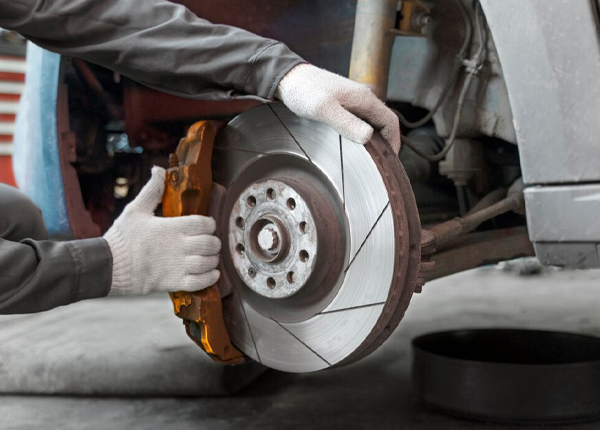What is the best oil for a Subaru Outback?
Like any vehicle, you should want the best oil for your Subaru Outback. But what is the best oil for your car? Let’s take a look at what Subaru recommends for the Outback.
Due to its low-friction engine design, the best oil for the Subaru Outback is 0W-20 synthetic oil. It is vital to use only API certified oils with the proper viscosity classification. If you’re not sure which oil to use, check your Subaru Outback’s owner’s manual.
A vehicle is only as good as the oil that lubricates its engine, so make sure that you only use the best for your Subaru Outback. In this article, we will take a closer look at the best oil for the Subaru Outback. Plus, we’ll be answering other frequently asked questions about maintaining this vehicle, so keep reading!
Before you read on, let’s just say we hope you find the links here helpful. If you buy something through a link on this page, we may earn a commission, so thanks!
What oil should I use in a Subaru Outback?
Known for its flawless handling in snow and off-road terrain, the Subaru Outback is a vehicle that can take you anywhere.
Whether you’re driving to the grocery store or taking a road trip across the country, your Outback will safely get you there. And like any good car, it needs the right oil to keep it running smoothly.
Subaru recommends using synthetic name brand oil with a viscosity of 0W-20. This oil is specifically designed for low-friction engines, which is what the Outback has. Be sure to use only oils that are API certified and have the correct viscosity classification; otherwise you could damage your engine.
Refrain from using low-quality or no-brand oil in your Outback. Not only will it not protect your engine, but it could also void your Subaru’s warranty. If in doubt, consult your Outback owner’s manual or ask a professional mechanic.
If, for some reason, you can’t get 0W-20 oil, 5W-30 or 5W-40 oil will also work. However, these oils are not as efficient as 0W-20 and should only be used as a temporary measure.
Even if you use a different viscosity, stick with synthetic oil. It’s more expensive than conventional oil, but it’s worth it in the long run. Synthetic oil lasts longer and better protects your engine, even in extreme temperatures.
While your engine won’t break down if you use conventional oil, it will have to work harder. As a result, you will end up using oil more quickly and may even shorten the life of your engine. So if you can afford it, stick with synthetic oil.
How often should I change the oil in my Subaru Outback?
How often you need to change your oil depends on a few factors, such as your driving habits and the type of oil you’re using. However, most mechanics agree that the oil in 2015 or newer Subaru Outbacks should be changed every 6,000 miles or 6 months, whichever comes first.
If you frequently drive in intermittent traffic or in extreme weather conditions, you may need to change your oil more frequently. The same is true if you use conventional oil instead of synthetic.
Some Subaru dealers claim you can go 7,500 to 10,000 miles without an oil change, but we recommend erring on the side of caution. After all, it’s better to be safe than sorry when it comes to your engine.
Also, if you have a Subaru Outback still under factory warranty, you’ll need to adhere to the maintenance schedule. If you miss the schedule, you could void your warranty.
Why does the Subaru Outback use 0W-20?
The Subaru Outback uses 0W-20 oil because it has a low friction engine. A low friction engine means the engine doesn’t have to work as hard, resulting in better fuel efficiency.
0W-20 oil is also thinner than other oils, so it flows more easily in cold weather. That’s why Subaru recommends this oil for drivers who live in colder climates.
5W-30 and 5W-40 oils can also be used in a Subaru Outback, but they are not as efficient as 0W-20. These oils are thicker and take longer to flow in cold weather. As a result, they can put more stress on your engine, which could reduce fuel efficiency.
By comparison, if you have a turbocharged Subaru, you’d use 5W-30 oil. This oil is designed for higher temperatures and can better handle the stress of a turbocharged engine.
So if you are looking for the best oil for your Subaru Outback, 0W-20 is the way to go. Not only is it more efficient, but it will provide the protection your engine needs, even in extreme weather conditions.
What happens if you don’t change the oil on time?
Depending on how many miles you go over the recommended oil change interval, you could seriously damage your engine.
If you go just 1,000 miles over the recommended interval, your engine oil will start to break down and you won’t be able to protect your engine as well. This can lead to increased engine wear and decreased fuel efficiency.
It also depends on how you drive your Subaru Outback when it’s low on oil.
If you frequently drive in intermittent traffic or in extreme weather conditions, you may need to change your oil more frequently. The same is true if you use conventional oil instead of synthetic.
When the oil service light is on, check the remaining oil life. If it is below 20%, change the oil as soon as possible. It is better to be safe than sorry when it comes to your engine.
To survive, stop at a gas station and buy a liter of oil. This will help you until you can get to a mechanic.
How much does it cost to do an oil change in a Subaru Outback?
The cost of an oil change depends on a few factors, like the type of oil you use and where you go to get it done. That being said, you can expect to pay an average of $100 for an oil change in a Subaru Outback.
You may be able to save money by doing it yourself, but we recommend leaving it to the professionals. They have the tools and experience to get the job done quickly and efficiently.
If you are looking for a place to change your oil, we recommend that you go to a Subaru dealer. They will use the correct oil for your car and may offer other services such as a tire rotation or an engine analysis.
If you change the oil yourself, be sure not to:
overfill oil
Overfilling the oil may cause leakage or foam. This can lead to engine damage, so be sure to only add the recommended amount of oil.
If you accidentally overfill the oil, please do not start the engine. Instead, drain the oil until it is at the correct level. To avoid this error, double check the oil level before you start adding oil.
Also, check your owner’s manual for oil capacity. This will tell you how much oil your car takes.
Use the wrong oil
Your Subaru Outback requires 0W-20 oil. This is because it has a low friction motor. If you use a different oil, like 5W-30, it can cause more wear on your engine.
Overtighten the oil drain plug or oil filter
Both the oil drain plug and the oil filter should be tight, but do not overtighten. This can cause damage and lead to leaks.
To prevent this, hand tighten the oil drain plug and use a wrench to tighten it. For the oil filter, tighten it by hand, then turn it an additional 1/4 to 1/2 turn.
If you turn the oil drain plug on or strain too much, you can damage the threads. This will require a new oil pan or oil filter housing. Your oil will also leak until you fix the problem, which can cause your engine to overheat.
Reuse an old oil filter
It is best to use a new oil filter every time you change your oil. If you don’t, the oil filter can become clogged, which can damage the engine.
An oil filter is vital to the health of your engine, so make sure you don’t skimp on this part of your oil change.
Forget to reset the oil light
After changing the oil, don’t forget to reset the oil light. The light is there to remind you when it’s time for your next oil change.
To reset the light, see your owner’s manual. Every car is different, so the manual will tell you how to do it correctly.
If you don’t reset the light, it will stay on and keep reminding you to change your oil, even though you have already done so. Also, you may lose track of when the next oil change is.
to finish
In general, changing the oil is a fairly simple and straightforward process. Best case scenario go to a Subaru dealer and have them do it for you. This will ensure that the job is done correctly and that you are using the correct oil.



